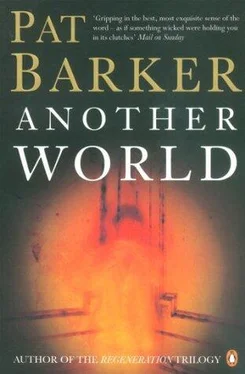‘Still, if they help the pain…’
‘Nah, hot-water bottle’s as good as anything.’
‘Have you got one?’
‘Frieda’s bringing one up now.’
‘Must be nice being in your own bed.’
‘Champion.’ He sounds exhausted. ‘Look, I’m a bit bushed, son. I’ll hand you back to Frieda, if you don’t mind.’
Frieda shouts, ‘Hello?’
‘Is he really all right?’
‘Oh, I think so.’ Doubtfully.
‘Do you want me to come over?’
‘No, we’re fine. Tell you what, why don’t you come over for tea tomorrow? Bring Miranda. It’ll do him good to have a bit of young company.’
‘All right. You’re sure you can manage tonight?’
‘Why aye, man.’
He puts the phone down and goes to find Fran.
‘Was that Frieda?’
‘Yes, he’s back home.’
‘Already?’
‘Yes.’
‘Are you going across?’
‘No, not tonight. She’s asked me to go for tea tomorrow.’ He doesn’t know how to say that only he and Miranda are invited.
Gareth says, ‘Ssh.’ And for once Nick’s glad of the interruption.
‘Will you be taking Miranda?’ Fran asks.
It’s slipped in casually, one of those quietly lethal questions Barbara used to specialize in. Since no two women could be less alike, he’s forced to conclude he’s the type of man who inspires lethal questions. ‘Yes.’
She nods.
‘What’ll you do?’
‘Take Gareth shopping. He needs school shoes.’
She comes out on to the drive to say goodbye, a surprisingly fond farewell for so short a separation. Because the family’s splitting into its constituent parts, they need to be gentle with each other. As she bends into the car to kiss him, he grasps her hand and she winces as the wedding ring bites. ‘Don’t wear yourself out,’ he says.
Once they’re on the road, Miranda stares out of the window at the passing fields, and Nick’s grateful for the silence. He needs to prepare himself. The morning call from Frieda hadn’t been reassuring. She was going to try to get some sleep, she said, while Grandad was watching cricket. ‘How was the night?’ Nick asked. A second’s hesitation. ‘A bit lively.’
Nick stops outside the house and sees, with a jolt of fear, that the curtains are drawn. Well, she’s asleep, it means nothing. All the same he tells Miranda to stay in the car and tries the door. Locked. He rings the bell and a pink face blurred behind frosted glass surfaces to meet him. Frieda’s voice: ‘Who is it?’
‘Me.’
She unlocks the door. Doesn’t need to say anything, for there, framed in the open door of the living room, is Geordie, wrapped in a dressing-gown, watching television. Not dead, not yet, though Nick can see, even in the dim light reflected from the screen, that it won’t be long. He’s aged twenty years in the past week. Not in the sense of being more wrinkled or stooped, he’s simply thinner. When he reaches up to receive Nick’s hug his dressing-gown falls open and beneath the skin Nick sees, not merely ribs, but the beating of his heart. He’s become a skeleton leaf. The merest breath of wind would blow him away, and yet he’s still upright. Still the sunken eyes are clear.
‘How’s it going, Grandad?’
‘Bloody awful. There’s only Atherton in double figures.’
No way of telling whether the misunderstanding’s genuine or whether he’s simply determined not to talk.
‘I meant, how are you feeling?’
‘Not so bad. Got the stitches out.’
Almost boastfully, he pushes down his pyjama trousers to show the wound, wounds rather. Beside the bayonet wound, Shepherd’s handiwork looks almost prissily neat. A surgical incision: nothing like this ancient scar, this relic of an attempt at gutting a human being. ‘It’s going on well, isn’t it? Does it hurt?’
‘A bit.’ But it’s the bayonet wound he’s cradling in his hand.
‘I’ve brought Miranda to see you.’
‘Oh, good.’
Is it Nick’s imagination, or is there a fractional hesitation, a shadow of doubt, as to who Miranda is?
‘She must be nigh on fourteen, isn’t she?’
It is Nick’s imagination. Geordie knows exactly who she is.
‘Where is she?’ says Frieda. ‘You’ve surely never left her in the car?’
He can’t explain about the drawn curtains. ‘I’ll get her.’
Miranda comes in shyly, standing self-consciously by the china cabinet while they exclaim over her height. She’s going to be a tall girl. Nick sees it more clearly now he’s looking at her through their eyes, and for a moment he feels almost dizzy, wanting to slow the pace. He seems to be living in one of those speeded-up sequences beloved of wildlife photographers. Fran’s stomach swelling, the children growing, the house rose blooming and decaying, Geordie dwindling into death before his eyes. Time must move at a constant pace, he supposes, but that’s not how we experience it.
He waits until Miranda and Grandad are chatting, then goes into the kitchen to help with the tea.
‘What pills is he taking?’
She gets them down from the shelf. ‘Mr Shepherd says if the pain gets very bad he’ll have to go back into hospital, but as long as he’s OK he can stay at home.’
‘Does he think it’ll get bad?’
‘No, he says quite often they just slip away.’
‘Doesn’t sound much like Geordie, does it?’
‘No, it doesn’t.’ She stands twisting a pink striped tea towel round in hands that are as creased as tissue paper. ‘I don’t like to think about it.’
You’ll have your life back, Nick thinks, but he can’t say that. There’s too much he doesn’t understand in this relationship. He knows that sometimes — no, often — Geordie and Frieda behave more like husband and wife than father and daughter. Not that he’s suggesting — or thinking — anything wrong, but, emotionally, that’s the truth. Just as when she forgets and refers to Grandad as ‘your dad’ that’s also the truth. ‘I’ll carry the tray,’ he says, and she holds open the door.
In the hospital Geordie had a beaker, but here he’s reverted to his usual method of drinking tea, pouring a small amount into a saucer, blowing on it assiduously for several minutes, then raising the saucer to his lips. One of the recurring sights of Nick’s childhood: an orange sea with the gale of grandfather’s breath blowing across it. It had been a source of tension at home; Nick’s father thought the habit utterly disgusting.
The saucer, precariously balanced, makes it all the way to Grandad’s lips. He sips delicately, repeats the performance, and then he’s had enough.
‘I can’t seem to keep tea on my stomach,’ he explains apologetically, passing the saucer back. ‘Fills me full of wind.’
Every twinge of pain — and in spite of all his disavowals it’s quite clear from his braced position, his restlessness, that he is in pain — is firmly dismissed as ‘wind’. An innocuous problem uniting the two ends of life.
The talk revolves round him, small circular talk about family events, past and present, Miranda’s school, what she wants to be when she grows up. On the screen men in white run up and down, or — more often — walk on and off, but silently. England are all out for a total that seems incredible. Geordie’s eyes are closed, he doesn’t notice or comment on the disaster. Abruptly he opens them and quotes with approval a tombstone he once read: Let your wind go freeWhere ere ye may be.For ’twas the wind that killed me.
Never one to proffer advice he’d be afraid to follow, Geordie accompanies the quotation with an immensely long rumbling fart. Then he needs the toilet, urgently.
‘It’s like this,’ Frieda explains to Miranda. ‘He either can’t go at all or he’s got the runs. Never anything in between.’
Читать дальше












